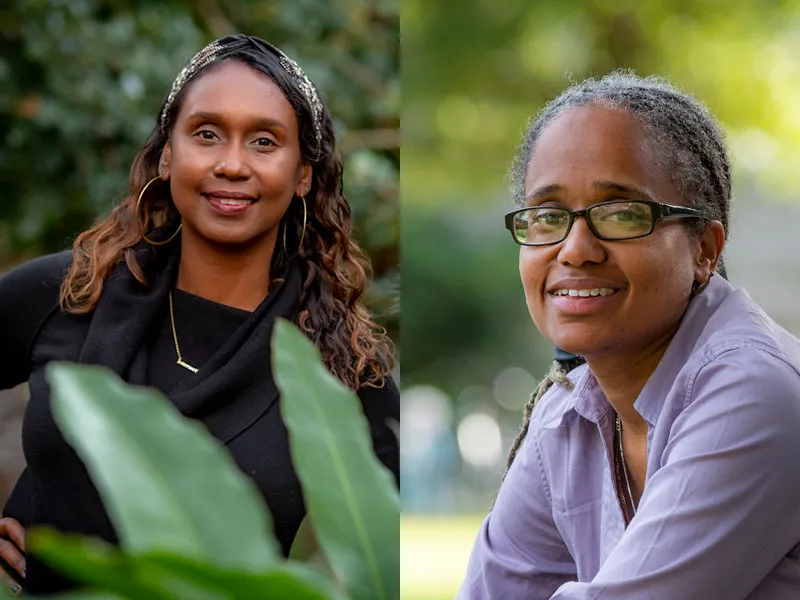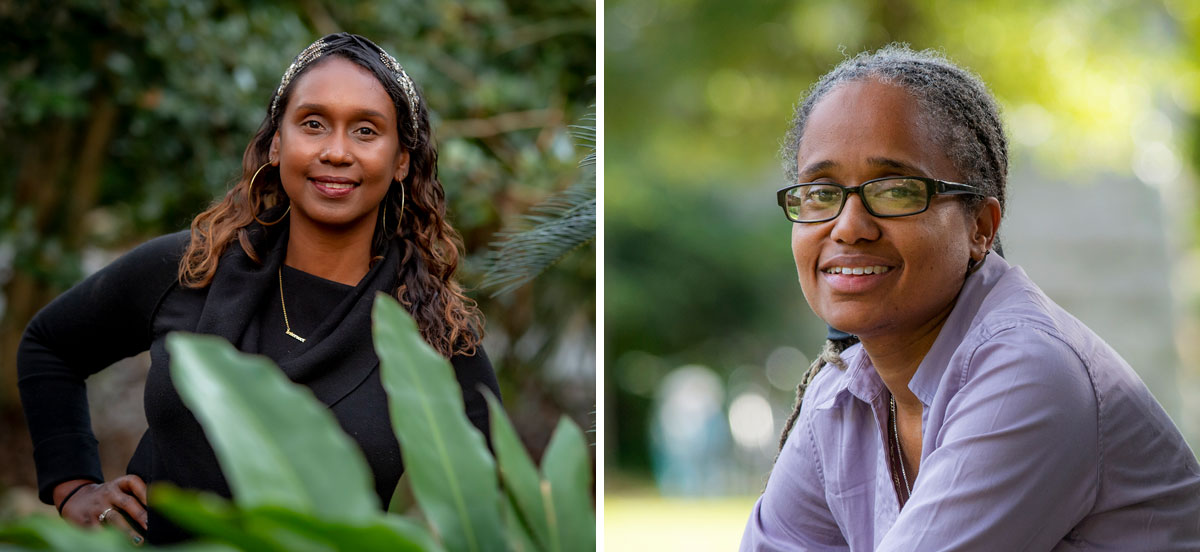

As we closed 2021, Mia L. Bagneris, associate professor of art history and director of the Africana Studies Program, was selected by President Michael A. Fitts for the Spirit of Tulane Research Award in recognition of her work during the COVID-19 pandemic and its embodiment of Tulane’s motto: Non sibi, sed suis (Not for one’s self, but for one’s own).
And as we began 2022, the National Endowment for the Humanities awarded a grant to associate professor of history and previous director of the Africana Studies Program, Laura Rosanne Adderley, for the completion of her upcoming book, Practicing Emancipation: Slave Ship Survivors, Atlantic Abolition, and the Everyday Politics of Freedom.
Through the dedicated leadership of Bagneris and Adderley, the Africana Studies Program fosters ongoing conversations about systemic and structural racism critical to cultivating an anti-racist campus community, and their commitment to the research—both historically investigative and future-focused—continues to underscore its growth.
The Tulane Research, Scholarship, and Artistic Achievement Awards celebrate outstanding scholars and exceptional research achievement and impact on advancing knowledge in all academic fields of study. Selected for the inaugural Spirit of Tulane Research Award, which recognizes the outstanding achievements of individuals whose work embodies Tulane’s motto, “Not for oneself, but for one’s own,” Mia Bagneris was awarded for her contributions as current director of the Africana Studies Programs and her scholarship as an associate professor of art history, which centers on representation of race in the Anglo-American world, and the place of images in the histories of slavery, colonialism, empire, and the construction of national identities. Her recent efforts are reflected in her current book project, Imagining the Oriental South: The Enslaved Mix-Race Beauty in British Art and Culture, as well as in her commitment to build a vibrant and thriving Black studies department that becomes a regional—and eventually national—hub for the discipline.
Under the leadership of Bagneris, Africana Studies recently secured an EDI (Equity, Diversity, Inclusion) Initiative Committee award to fund a three-year pilot program with the aim of building an intergenerational Black studies scholarly community that will position Tulane as the hub for Black Studies in New Orleans. The initiative’s recently launched Black Studies Book Club aims to bring together diverse constituencies of the Africana Studies Program, including Tulane students, faculty and staff and local community members, as well as students and faculty from the program’s local partner—New Orleans Math & Science Charter High School. The series will host an event each semester with a visiting scholar whose recent publication has shifted the conversation in Africana Studies, for a public lecture and book club-style conversation.
Building this [Africana Studies] program is part of my dream. I am committed to it. —Mia L. Bagneris
The School of Liberal Arts’ continued support of the Africana Studies Program is a commitment to our recognition of the contribution the discipline makes to the intellectual life of a world class university and to educating the global leaders of the future. The program’s educators bring innovative scholarship and teaching to a unique undergraduate curriculum that celebrates the city of New Orleans’ unique history, connection to Africa, and rich African diasporic culture as a point of entry for broader explorations of the continent and its diasporas.
Continuing the celebration of success in Africana Studies, the National Endowment for the Humanities awarded a grant to professor Laura Rosanne Adderley in January 2022 to support the completion of her upcoming book, Practicing Emancipation: Slave Ship Survivors, Atlantic Abolition, and the Everyday Politics of Freedom. Adderley, an associate professor of history, served as the director for the Africana Studies Program from 2013-2020, and is currently one of two Tulane representatives on the Board of the Amistad Research Center. She works primarily as a comparative slavery historian, with a focus on the 19th century, teaching broadly across African diaspora, Caribbean and African-American history courses for both undergraduate and graduate students.
I am simply thrilled to learn of Rosanne’s achievement, and proud to congratulate her on this remarkable recognition and support of her important and exciting upcoming project. —Dean Brian Edwards
Adderley’s first book, New Negroes from Africa: Slave Trade Abolition and Free African Settlement in the Nineteenth-Century Caribbean (Indiana, 2006), presented a century-long exploration of the impact of African re-captives on black identity-formation and on religious and social cultures in two contrasting Caribbean territories. Her new project focuses on a narrower time period, and takes a different intellectual focus—it centers the everyday life and labor of a unique group of slave ship survivors in the decade before British Caribbean emancipation. Adderley explains, "This project seeks to intricately probe everyday definitions of freedom made by the earliest African re-captives during a pivotal moment in slavery and emancipation history—a moment that has seen many studies of the meaning of freedom, but few from a perspective quite like theirs."
With the aim of bringing a large chorus of ordinary black voices to discussions about the end of slavery in the 1800s, this project will imaginatively reconstruct an overlooked story of the age of emancipation as it unfolded in real time. —Laura Rosanne Adderley
We are incredibly proud that leaders Adderley and Bagneris continue to be recognized for their ongoing research and collaboration, and eager to witness how this recognition will support both women and their colleagues in advancing the program’s continued efforts towards the study of Africa and its diasporas around the globe, as well as the study of race and anti-Black racism.

